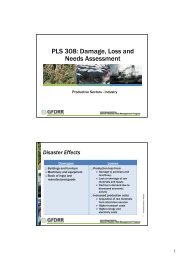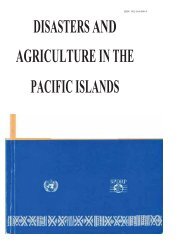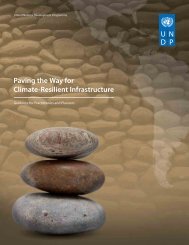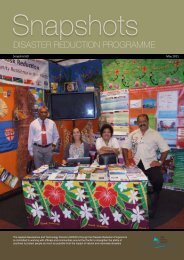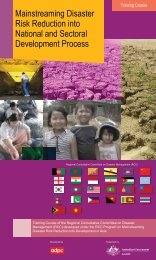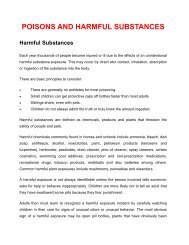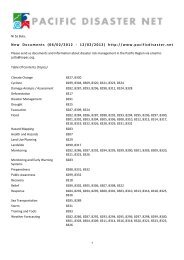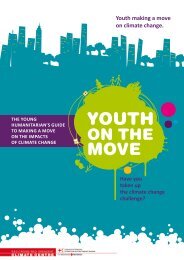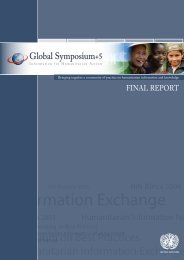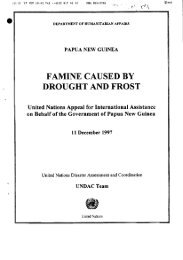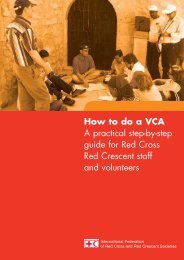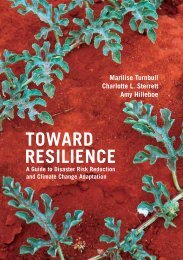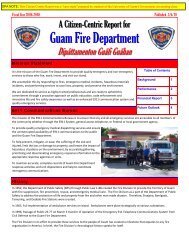A global review of disaster reduction initiatives - Welcome to the ...
A global review of disaster reduction initiatives - Welcome to the ...
A global review of disaster reduction initiatives - Welcome to the ...
Create successful ePaper yourself
Turn your PDF publications into a flip-book with our unique Google optimized e-Paper software.
4Living with Risk: A <strong>global</strong> <strong>review</strong> <strong>of</strong> <strong>disaster</strong> <strong>reduction</strong> <strong>initiatives</strong>184A comprehensive Inter-American Strategy waslaunched in 1999 <strong>to</strong> reduce <strong>the</strong> education sec<strong>to</strong>r'svulnerability <strong>to</strong> hazards by initiative <strong>of</strong> <strong>the</strong>Unit for Sustainable Development and Environment<strong>of</strong> <strong>the</strong> Organization <strong>of</strong> AmericanStates (USDE/OAS), working with PAHOand ISDR. Known as EDUPLANhemisferico,<strong>the</strong> program seeks <strong>to</strong> engage public andprivate institutions, national and internationalagencies, NGOs and private individuals <strong>to</strong>encourage member states <strong>to</strong> adopt <strong>the</strong> ActionPlan for Reducing <strong>the</strong> Vulnerability <strong>of</strong> <strong>the</strong>Education Sec<strong>to</strong>r <strong>to</strong> Disasters through a variety<strong>of</strong> international forums. With a TechnicalSecretariat for General Coordination located atPeru's National University at Trujillo, EDU-PLAN works through eight technical focalpoints located in Argentina, Costa Rica,Trinidad and Tobago, <strong>the</strong> United States, andVenezuela <strong>to</strong> conduct activities at a number <strong>of</strong>local, national and regional locations. Work isdivided in<strong>to</strong> three areas: academic improvement,citizen participation, and physical infrastructureprotection. There is a commitment <strong>to</strong>improve <strong>the</strong> curriculum with <strong>the</strong> addition <strong>of</strong>more elements pertaining <strong>to</strong> risk <strong>reduction</strong> inprimary, secondary and higher education sothat individuals and groups <strong>of</strong> various pr<strong>of</strong>essionalinterests are prepared <strong>to</strong> work <strong>to</strong>ge<strong>the</strong>rfor <strong>disaster</strong> <strong>reduction</strong>.In ano<strong>the</strong>r sec<strong>to</strong>r in Latin America, progress inrisk management in <strong>the</strong> public health serviceswould not have been possible without buildingadditional pr<strong>of</strong>essional capacities. Independentconsultants and local pr<strong>of</strong>essionals have agreedthat a low-cost, culturally sensitive strategy is<strong>the</strong> most effective way <strong>to</strong> contribute <strong>to</strong> <strong>the</strong>LÍDERES is a vulnerability <strong>reduction</strong> course in Spanishorganized by PAHO/WHO taught almost exclusively bynational specialists with international reputations with <strong>the</strong> aim<strong>of</strong> streng<strong>the</strong>ning <strong>the</strong> managerial skills required by <strong>disaster</strong> risk<strong>reduction</strong> practitioners. The content <strong>of</strong> <strong>the</strong> LÍDERES courseis constantly evolving and is revised in response <strong>to</strong> <strong>the</strong> needs<strong>of</strong> its target audience, <strong>the</strong> Latin American <strong>disaster</strong> <strong>reduction</strong>community.A multi-sec<strong>to</strong>ral course programme sponsored byOFDA/USAID in partnership with national governmentsand NGOs has a key advantage that Latin American andCaribbean agencies can hire pr<strong>of</strong>essionals from neighbouringcountries and benefit from <strong>the</strong>ir knowledge about local contextsand cultures, in addition <strong>to</strong> <strong>the</strong>ir local language abilities.<strong>reduction</strong> <strong>of</strong> risk. All ministries <strong>of</strong> health inLatin America and <strong>the</strong> Caribbean now employat least one <strong>of</strong>ficial who is in charge <strong>of</strong> <strong>disaster</strong>s.In many countries <strong>the</strong>re is an entiredepartment or agency devoted <strong>to</strong> <strong>the</strong> subject.In Argentina, Bolivia, and Chile, new waterand sewage concessions demand that participatingprivate sec<strong>to</strong>r companies meet <strong>disaster</strong><strong>reduction</strong> criteria in <strong>the</strong> construction, operation,and maintenance <strong>of</strong> water and sanitationsystems. Vulnerability studies have been carriedout in Brazil, Chile, Costa Rica, Ecuador,Peru, and Venezuela <strong>to</strong> examine water supplyand sewage systems. This has led <strong>to</strong> anincreased availability <strong>of</strong> current technical informationand a growing demand for training in<strong>disaster</strong> <strong>reduction</strong> in this field.LA RED has developed a methodology fortraining <strong>of</strong> local authorities in risk management.It has elaborated training modules andsupport material, with important conceptualcontributions in <strong>the</strong> area <strong>of</strong> vulnerability <strong>reduction</strong>and risk management. This methodologyis currently being applied in many countries in<strong>the</strong> region and adapted <strong>to</strong> local conditions.AfricaAs current risk <strong>reduction</strong> efforts in SouthAfrica require a considerable amount <strong>of</strong> intersec<strong>to</strong>ralcollaboration, a Training and CapacityBuilding Working Group has been establishedwithin <strong>the</strong> national Inter-departmental DisasterManagement Committee <strong>to</strong> form one bodythat can moni<strong>to</strong>r <strong>disaster</strong> management trainingand research throughout <strong>the</strong> country. Theworking group is compiling a comprehensiveframework for all types <strong>of</strong> formal and non-formal<strong>disaster</strong> management training and o<strong>the</strong>rcapacity building programs. It is also in <strong>the</strong>process <strong>of</strong> establishing a body <strong>to</strong> set standardsfor <strong>disaster</strong> management training consistentwith <strong>the</strong> accreditation requirements <strong>of</strong> <strong>the</strong>National Qualifications Framework and <strong>the</strong>South African Qualifications Authority.Schools for community outreach play a vitalrole in <strong>the</strong> community. A proper educationthrough <strong>the</strong> schools not only teaches <strong>the</strong> childrenbut also reaches deep in<strong>to</strong> <strong>the</strong> communitythrough <strong>the</strong> parents and teachers. It isobserved from past experience that <strong>the</strong> basicproblems related <strong>to</strong> <strong>disaster</strong> mitigation and



